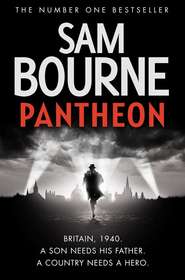По всем вопросам обращайтесь на: info@litportal.ru
(©) 2003-2024.
✖
The Chosen One
Автор
Год написания книги
2019
Настройки чтения
Размер шрифта
Высота строк
Поля
She next went rightward, to The Corner.
Normally it takes at least a few years for a Democratic politician to start falling apart. Credit to Baker for speeding up the process. Now all he needs to do is show similar alacrity and fast-track his deficit-reduction plan.
Over at the liberal Daily Kos she detected definite anxiety:
MSNBC is so far citing just one unnamed source. They’d better have proof.
She glanced up at the TV; still no more news. Time seemed to have slowed to a crawl. Her mind was wandering, something in recent weeks she had been working very hard to avoid. She was back on the steps of the Lincoln Memorial, replaying the conversation with Uri in her head. As the memory unspooled, she felt the melancholy creeping back inside her, like a vapour entering her lungs. To push it out and away, she reached for the Sudan file: maybe that bulging box of memoranda and cables, all classified, would help her tell the President what he needed to do. And distract her from herself.
The TV announced a news alert. The network that had broken the story now confirmed that it had documentary evidence of Stephen Baker’s past treatment for depression. ‘MSNBC is satisfied these papers are genuine,’ the anchor declared with the portentous baritone Maggie guessed was usually reserved for presidential assassinations.
So it was true. Maggie sat back in her chair. Until now, she realized, she had held back her reaction, unsure what, exactly, she was meant to be reacting to. Now she no longer had that excuse.
She wanted to be like that blogger, full of compassion and apparently unfazed by the prospect of a president with a history of mental illness. She knew that should be her attitude, too, just as she knew she should eat organic food. But she couldn’t quite persuade herself to feel it.
Besides, she had the same attitude as the ‘folks’ Stuart had talked about. It wasn’t the crime – being depressed was surely no crime – it was the cover-up. If medical disclosure meant anything, it should have meant levelling with the electorate.
But that wasn’t quite it, either. Maggie knew it would have been risky, verging on suicidal, for a candidate to start blubbering about his time on the psychiatrist’s couch in the middle of a presidential election – especially when his opponent had allowed him to skip the details. She knew why he hadn’t been able to come clean with the voters. But that didn’t soothe the nagging sensation she felt somewhere between her brain and her gut. For a fleeting second, the sensation formed itself into a sentence: he should have come clean with her.
She tried to push the feeling away, clicking again on the refresh button on the New York Times website, not taking in a word she read. It was, she knew, ridiculous to regard this as a personal betrayal. There had been many people far more senior than her on the campaign team; Stephen Baker was under no obligation to share the stories of his past with her. He had told her no lies. It was not as if she had ever asked the question.
And yet the nagging feeling was still there. She had jacked in her job and gone to work for him nearly eighteen months ago, in those days when his staff could fit into a minivan and the pundits said he might be a realistic prospect in the presidential cycle after next. They had run up tens of thousands of air miles together. She had eaten in his home, played with his son and daughter and chatted with his wife. She had put her faith in him. And so had the country.
The Breaking News ident was flashing again on the TV. Maggie reached for the volume control. ‘This word just into us here at CNN: the President is to make an emergency statement.’
At Sanchez’s invitation, she watched it in the press room, fighting hard not to put her hands to her face and peer through splayed fingers, the way she used to watch teatime science fiction as a child.
‘My fellow Americans,’ he began, his voice steady, his face calm and businesslike. ‘I am not here to deny what you heard today. I am here to tell you what happened. With the frankness and candour that I should have shown earlier.
‘Long ago, in my early twenties, I hit a difficult patch in my life. I have not spoken about it before because the source of my unhappiness involved another person.
‘As you know, my mother died a few months back – in the very last week of the campaign, as it happens – so perhaps now it can be told. Though even now, as I brace myself to say these words, I tremble at the thought that I might be dishonouring her memory. But you need to hear the truth.
‘When I was a teenager, I suspected my mother was an alcoholic. It took me some time to reach that conclusion. When you’re thirteen years old and your mother sinks some vodka into her orange juice at breakfast, you don’t always notice. And if you do notice, you don’t always know that that’s not normal. That that’s not how all moms behave. But by the time I was in college, I knew for certain.
‘Once I was making my own way in the world, this knowledge began to eat away at me. Was I fated to follow in her path? To stumble the way she had stumbled? Would I too become an addict of alcohol?
‘I was laid low by these thoughts. And, yes, eventually I sought professional help. The help of a psychiatrist, among other folks. I wanted to know if my destiny had already been determined, if it was written in my genes.
‘Eventually I came out of what the poets call this “slough of despond”. But it was not the doctors who lifted me from that dark place. My mother, on hearing that I had sought help, was shaken out of her own disease. You might say it was a wake-up call. She woke up, joined AA and got sober. When she died last October, she was proud to say that she had gone twenty-four years, eight months and nineteen days without a drink. It was a great achievement. I’m as proud of her for that as she was of me for getting to the brink of the presidency. But it was private. And I chose to honour that.
‘Perhaps that was a mistake. But now I hope you understand. Why I needed the help in the first place and why I did not rush to tell you, the American people, all about it. I cannot know how you will react to this news. But I am taking the risk that you will respond as so many American families do when they are confronted with news that disappoints. With the generosity of spirit that made us – and makes us still – a great nation. Thank you.’
Maggie stood, staring, barely daring to breathe. In the silence, she heard the sound of a single pair of hands clapping. Then another and then several more, until there was loud, sustained applause. She was sure she heard Tara MacDonald give a single whoop.
Sanchez passed her his iPhone, already open at the Sullivan blog. She only had to read the first sentence: Stephen Baker has just reminded the American people why they chose him to be their president last fall.
‘OK, people,’ Tara yelled, silencing the last few claps of applause. ‘We’re not out of the woods yet. Fox and the others are going to be yakking all night about “the questions that still need to be answered”. We need to be ready.’ She shot a glare at Maggie and Sanchez standing together. ‘We don’t need to be talking to each other, we need to be talking to the American people. I want a list handed to me no more than ten minutes from now, giving the names of surrogates ready to be in front of a camera heaping praise on President Stephen Baker for being brave, for being honest and for being a devoted son. Any questions?’ She didn’t wait for a reply. ‘Good. Now get to it.’
Maggie decided to take the hint and leave, mouthing a thank you to Sanchez. Tara MacDonald was right to be cautious, but Maggie had lived in America long enough to know that the public would like what they had seen. They would not turf out a new, young president for the crime of loving his mother and worrying about the inheritance she might have passed to her son.
She was right, too. The cable networks were kind, hosting discussions about whether alcoholism was hereditary and on the usefulness of therapy. For a few blessed hours, authors of books with titles like Please Mommy, Stop and Talking Makes It Better replaced the usual political talking heads. Almost all spoke with compassion for Stephen Baker, though Rush Limbaugh had apparently taken to his microphone an hour after the President’s personal statement to ask his listeners, ‘Do we really want a whack-job with his finger on the button?’
The consensus in the White House was that Baker had dodged a bullet. Indeed, the relief lasted all the way until the next day. Except in the Baker household. Where it was about to vanish in the cruellest way possible.
FIVE (#ulink_6a69fc94-9a68-5ad0-8c17-a193a77ea587)
Washington, DC, Monday March 20, 19.16
Jen, those new sneakers are COOL!
Katie Baker read the messages on her new friend Jennifer’s Facebook wall and was all set to add her own. But her fingers hesitated over the keyboard. Back in Olympia, she would have hammered out a dozen messages by now but here it was so different. Her mom had told her she had to be triple careful. ‘Remember, sweetie: no names, no pictures.’
No pictures? That was so harsh! Everyone posted photos on their Facebook page but here – in fact, ever since November – she was told she couldn’t. ‘You can put up pictures, honey,’ Mom had said. ‘Just none that show you, your brother or any of your closest friends. Nothing that identifies you.’
Her brother? Like that was ever going to happen. She didn’t mind keeping that annoying jerk out of her pictures. But her friends? Why did she have to be the one who was different?
Oh, yes. Because her father was President of the United States, that’s why. Which was cool, no doubt. She had already met several of her favourite stars and she had been in People magazine – though in that picture she’d had to hold hands with her brother. Yeeuch!
Someone had sent a new message, which popped up on Jen’s wall.
I heard that Brandon invited you to the Zygotes show at the 9.30. Does that mean you two are like going out?!!
She began typing. OMG, Jen! If that is true, I am so jealous! I love the Zygotes!
She wondered if that gave away too much detail. The 9.30 hardly counted as giving away a place, did it? So the 9.30 Club was in Washington, DC. Was there anyone in the world who didn’t know that thirteen-year-old Katie Baker lived in Washington, DC?
She clicked out of Jen’s and back to her own Facebook page. What she saw when she got there made her frown.
Kimberley Baker was preparing supper, doing her best to keep things normal. Partly for her husband’s sake, mainly for her kids. Politically, the President of the United States might have survived what had happened today but she was not so sure how Stephen Baker would cope.
The most private thing about him was now public property. When they were going out it had been the last revelation he had made to her. Only once they had been together many months did he tell her about his mother’s alcoholism and the treatment he had sought. Once he had spilled everything, and she had responded with a long, tight hug, he had asked her to marry him. And now he had had to expose the secret he had guarded so zealously, on national television. She knew how much he would hate that.
Still, he was a strong man; he would survive. But what about Katie and Josh? To her surprise the kids had seemed to be doing OK. They had started school, made some friends; Katie had even been to her first DC slumber party. Of course, Kimberley had questioned the motives of both Jennifer, the classmate who had been so eager to make Katie her BF, and her equally keen parents. Kimberley didn’t need to open the Washington Post to know that the Bakers were now deemed the hottest social property in the city and any contact, even vicarious, was a major trophy.
She had wondered if this morning’s revelation would see all that come crashing down. She didn’t care about herself; she wouldn’t mind if she never went to another Washington party. But she couldn’t bear to imagine what her children might be put through. Stephen had agreed they would maintain the no-newspapers rule they had observed back west. Nor was it any kind of sacrifice to ban cable TV. And the staff were wonderful, never mentioning a thing.
But, she knew, that was not where the danger lurked. It was school, specifically the meanness of other children, that frightened her. She knew how cruel they could be. Yes, most of the pupils at the school they had chosen would be fawning over Katie and Josh, but it would only take one rebel, one troublemaker who saw there was sport to be had in teasing the daughter of the President of the United States. And what ammunition any would-be playground tormentor had just been handed. Psychiatric treatment.
And yet the children had said nothing about it. They had come home, picked up from the school gate by Zoe, the Secret Service agent masquerading as an au pair – albeit one who drove an armour-plated minivan with blacked-out windows – and bounded up the stairs as if nothing were out of the ordinary. In Josh’s case, Kimberley Baker knew that meant all had been well. Her son couldn’t hide anything, even if he wanted to.
But Katie offered no such assurance. Was her silence proof that nothing had happened, that she had survived the day without mockery – or evidence that she had suffered an indignity so great it could not be expressed?
There was a message from her friend Alexis.
Hi K, hope you’re feeling OK this evening. Sorry today was so hard. You seemed to be coping really well though. You’re one tough chick!
Katie Baker read it again, checking the name. It was definitely from Alexis, but it made no sense. Alexis hadn’t been at school today. She’d got that bug that was going round. How would Alexis know how she’d been coping?











